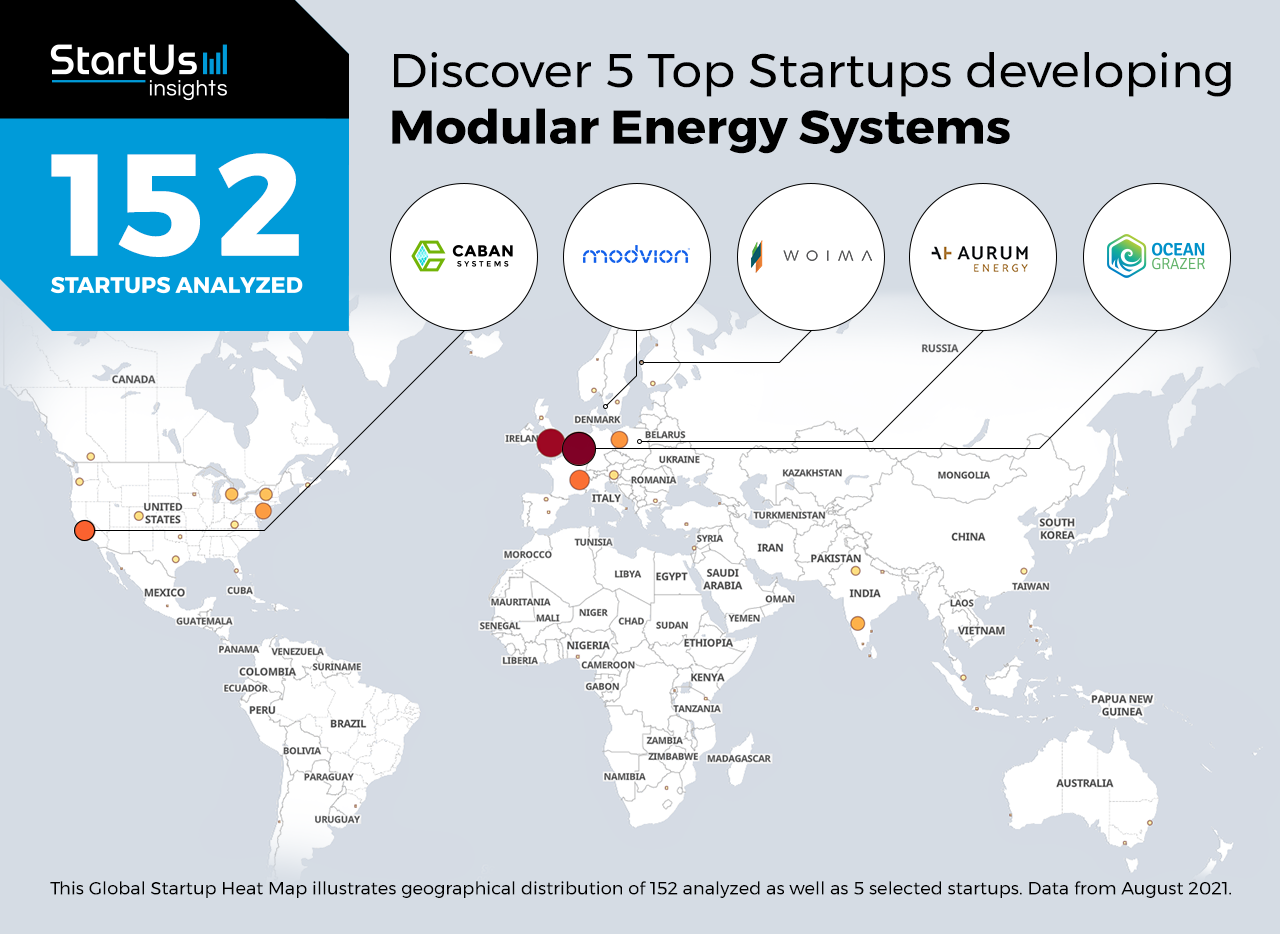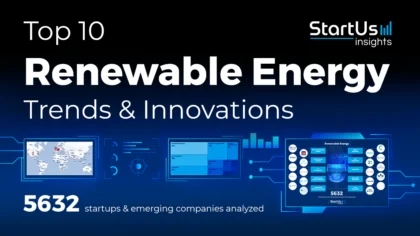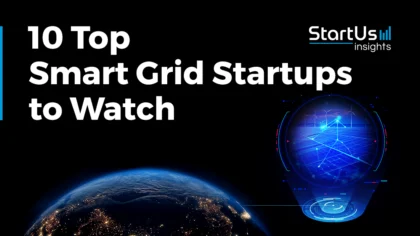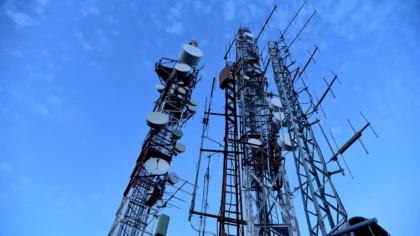Staying ahead of the technology curve means strengthening your competitive advantage. That is why we give you data-driven innovation insights into the energy industry. This time, you get to discover 5 hand-picked startups developing modular energy systems.
Global Startup Heat Map highlights 5 Top Modular Energy Systems out of 152
The insights of this data-driven analysis are derived from the Big Data & Artificial Intelligence-powered StartUs Insights Discovery Platform, covering 2.093.000+ startups & scaleups globally. The platform gives you an exhaustive overview of emerging technologies & relevant startups within a specific field in just a few clicks.
The Global Startup Heat Map below reveals the distribution of the 152 exemplary startups & scaleups we analyzed for this research. Further, it highlights 5 energy startups that we hand-picked based on criteria such as founding year, location, funding raised, and more. You get to explore the solutions of these 5 startups & scaleups in this report. For insights on the other 147 modular energy systems, get in touch.
Caban Systems offers a Modular Energy Storage Platform
Modular energy systems include integrated storage modules as well as modular power generation solutions. Modularity in energy systems enables mobility and flexibility in energy delivery and management. This way, energy companies advance electrification in areas inaccessible through grids and provide a cleaner alternative to fossil-fuel-based energy for remote localities.
Caban Systems is a US-based startup that develops a modular energy storage platform compatible with off-grid solutions. The startup provides stackable battery packs with a maximum capacity of 12 packs that offer 30kW power output. The modular platform also provides built-in thermal management and telemetry controllers. Further, the startup’s machine learning-based software, Enduro Energy Storage Platform, enables remote management, maintenance, and diagnostics of battery modules. Caban System’s storage solutions are useful for telecom power critical infrastructure at remote and dense metropolis areas.
Modvion builds Wood-based Modular Wind Towers
A 100-meter long wind tower produces more power output and has less air resistance than a conventional 80-meter wind tower. However, the additional 20-meter length increases the capital costs significantly, which is why wind power companies are still using 80-meter turbines. Advancements in modular wind power systems are tackling this issue by reducing the design complexity of wind turbines. Additionally, it reduces difficulties in wind turbine transportation and maintenance operations.
Swedish startup Modvion makes engineered wood-based modular wind towers. The startup’s patented modular wind energy system solves the present complications in tower mounting and logistics. Modvion’s turbines’ modularity further eliminates the need for structural requirements such as base width and wall thickness. Moving away from conventional steel-based design further enables the startup to reduce the cost of modular wind towers. Besides, the use of laminated timber instead of steel also makes this a carbon-negative solution.
Ocean Grazer builds a Modular Ocean Battery System
Startups build modular solar, wind, and tidal energy systems deployable in the sea. However, the success of such a system depends on how the energy is delivered to the grid. Some startups develop modular energy storage devices for applications in the ocean. Analogous to the batteries for land applications, these ocean energy storage devices allow operators to increase the storage capacity of a system based on energy generation.
Ocean Grazer is a Dutch startup that develops Ocean Battery, a large-scale modular electricity storage solution for wind turbines and floating solar farms. Ocean Battery is a scalable pumped hydro system in a box, where energy is stored as water under high pressure in flexible bladders on the seabed. Therefore, during high power demand, water flows back into rigid reservoirs, driving multiple hydro turbines to generate electricity. Moreover, it is an eco-friendly storage system as it uses clean water as an energy carrier and does not require rare earth metals.
WOIMA develops a Modular Waste-to-Energy Plant
Waste-to-energy power plants are efficient means to utilize the massive quantity of municipal solid waste (MSW) and minimize the amount of waste that reaches landfills. With modular gasification, transport and management of municipal solid wastes and other biomass wastes are easier. That is why startups develop more efficient waste-to-energy solutions that are readily deployable at scale based on the energy as well as waste treatment requirements.
WOIMA is a Finnish startup that builds modular waste to energy power plants. The startup’s WASTEWOIMA power plant technology incinerates solid waste to generate superheated steam that works on a steam turbine to generate power. Additionally, their proprietary technology combines heat radiation, cooling, waste heat recovery, and air pollution control systems in their power plants to improve efficiency and satisfy EU Emission Standards. WOIMA’s solution has a higher prefabrication rate as well as low operating and maintenance costs, ideal for rural, urban, and metropolitan applications.
AURUM ENERGY builds Modular Combined Heat & Power (CHP) Plants
CHP plants increase fuel efficiency and are an eco-friendly option for fuel optimization if renewables are the primary energy sources. Even though CHP plants reduce the user’s reliance on the grid, it comes with high capital investment. To combat this issue, startups develop modular CHP plants that consist of cogeneration units deployable based on the requirements of their customers, be it a small-scale project or an energy farm.
Polish startup AURUM ENERGY makes modular combined heat and power plants using fossil fuels and renewable energy sources. The startup’s cogeneration units generate heat and electricity in a single process, reducing fuel consumption and pollutant emissions. This allows companies and energy farms to manage the power supply and heating system in buildings while decreasing energy acquisition costs.
Discover more Energy Startups
Energy startups such as the examples highlighted in this report focus on Demand Side Management, Distributed Energy Resources, Quantum Computing as well as Energy Storage. While all of these technologies play a major role in advancing the energy industry, they only represent the tip of the iceberg. To explore more energy technologies, simply get in touch to let us look into your areas of interest. For a more general overview, you can download our free Energy Innovation Report to save your time and improve strategic decision-making.


![Dive into the Top 10 Energy Industry Trends and Innovations [2025]](https://www.startus-insights.com/wp-content/uploads/2025/03/Energy-Trend-SharedImg-StartUs-Insights-noresize-420x236.webp)






